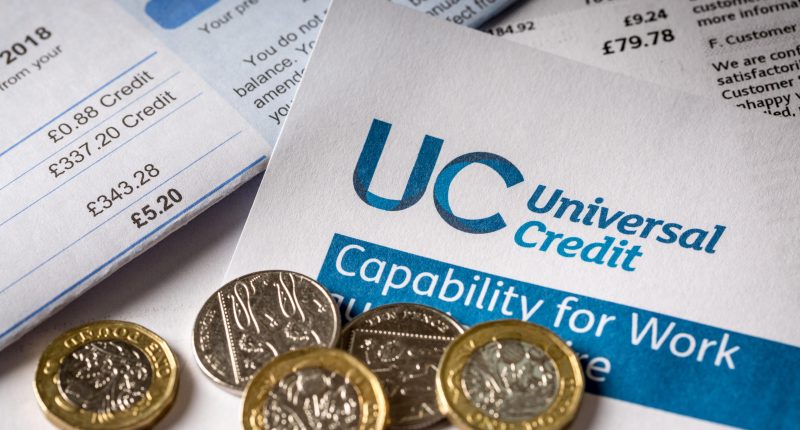UNIVERSAL Credit and a range of other benefits are set to rise within weeks and we reveal the key date to circle in your diary.
Millions will receive a pay boost from April as benefits go up in line with inflation for last September – 6.7%.
Those on the state pension will see a rise of 8.5% after the Government confirmed the triple lock.
Pension Credit will also increase by the same amount.
The Chancellor, Jeremy Hunt, announced the news in his Autumn Statement last November.
The Department for Work and Pensions confirmed these benefits will rise from April 8 – the first Monday after the new tax year begins.
read more in money
But the dates they will rise vary depending on the type of benefit and when you normally get paid too.
For example, if you normally get paid your Universal Credit on the fourth day of the month, you won’t see the pay boost until May 4.
Which benefits are going up?
A number of benefits have to go up in line with inflation as it’s the law. These include:
Most read in Money
A number of other benefits don’t have to rise in line with inflation, but the Government hikes them anyway so households don’t suffer a real-terms pay cut.
The list of benefits going up by 6.7% from April includes:
- Universal Credit
- Child benefit
- Contributory employment and support allowance
- Contributory jobseeker’s allowance
- Statutory maternity/paternity pay and maternity allowance
- Income-based jobseeker’s allowance (JSA)
- Income-related employment and support allowance (ESA)
- Income support
- Working tax credit
- Child tax credit
How much will my benefits go up?
How much your benefit goes up by will vary depending on which one you’re on as they pay out different amounts.
We’ve included a couple of examples below:
Universal Credit
Over six million people claim Universal Credit.
Under the system, you receive different amounts depending on your circumstances:
- If you’re single and under 25 – £292.10
- If you’re single and 25 or over – £368.74
- If you live with your partner and you’re both under 25 – £458.51 (for you both)
- If you live with your partner and either of you are 25 or over £578.81 (for you both)
But from April, this is how much you will receive:
- If you’re single and under 25 – £311.68
- If you’re single and 25 or over – £393.45
- If you live with your partner and you’re both under 25 – £489.23 (for you both)
- If you live with your partner and either of you are 25 or over £617.60 (for you both)
State pension
The full rate of the new state pension will go up from £203.85 a week to £221.20.
For the basic part of the old state pension, the rate will increase from £156.20 to £169.50.
How much pension you get will depend on your entitlement.
How to check what benefits you could be entitled to
The quickest way to see what benefits you may be able to claim is to use one of the three benefit calculators recommended by Gov.uk.
Each one is free to use. They are:
Before using the tools, make sure you have key financial information to hand, such as bank and savings statements, and information on pensions and existing benefits.
If you live with a partner or family, get their basic financial information together too as this could affect your claim.
For each of these, you’ll be asked information about your circumstances, such as your current employment and income.
You’ll also need to give information about yourself, including your age and who you live with.
You can then use the contact information on Gov.uk to get the ball rolling and apply for what you’re owed.
Of course, the tools only provide an indicator of what benefits you can claim – and usually don’t include means tested benefits, so you may be entitled to even more.
Housing benefit
Single person
- Aged under 25: Increases from £67.20 to £71.70
- Any age and on main phase ESA: Increases from £84.80 to £90.50
- Aged between 25 and state pension credit age: Increases from £84.80 to £90.50
- Has reached pension age: Increases from £217 to £235.20
Lone parent
- Aged under 18: Increases from £67.20 to £71.70
- Any age and on main phase ESA: Increases from £84.80 to £90.50
- Aged between 18 and state pension credit age: Increases from £84.80 to £90.50
- Has reached state pension age: Increases from £217 to £235.20
Couple
- Both aged under 18: Increases from £101.50 to £108.30
- One or both aged between 18 and state pension credit age: Increases from £133.30 to £142.25
- Any age and on main phase ESA: Increases from £133.30 to £142.25
- One or both have reached pension age: Increases from £324.70 to £352
Other
- Dependent child/young person aged under 20: Increased from £77.78 to £83.24
Personal Independence Payment
Rates for Personal Independence Payments (PIP) will rise.
PIP helps with the extra cost of living for those with illnesses or disabilities.
Payments for the daily living component will go up from £101.75 to £108.55 for enhanced and from £68.10 to £72.65 for standard.
For the mobility component, it will rise from £71 to £75.75 for enhanced, and from £26.90 to £28.70 for standard.
Employment Support Allowance
Employment Support Allowance (ESA) tops up workers’ pay if they’re on a low income.
Rates will change in April 2024 for those who are single and:
- Under 25-years-old, from £67.20 to £71.70
- Age 25 and older, from £84.80 to £90.50
- Lone parent under 18, from £67.20 to £71.70
- Lone parent 18 or over, from £84.80 to £90.50
Those in a couple will also see their rates rise:
- Both under 18-years-old, from £67.20 to £71.70
- Both under 18 years old with a child, from £101.50 to £108.30
- Both over 18, from £133.30 to £142.25
- Under 25, partner under 18, from £67.20 to £71.70
- Claimant 25 or over, partner under 18, from £84.80 to £90.50
There are also further rates for those with disabilities or caring responsibilities.
Attendance Allowance
Attendance Allowance helps with extra costs if you have a disability severe enough that you need someone to help look after you.
It’s paid at two different rates and how much you get depends on the level of care that you need because of your disability.
The higher rate will rise from £101.75 to £108.55, while the lower rate will also go up from £68.10 to £72.65.
Pension Credit
Retirees on a low income can get it topped up via Pension Credit.
Pension Credit will go up from £201.05 a week to £218.15 or for couples, from £306.85 to £332.95.
If your income is lower than this, you should be eligible for the benefit.
You could get the ‘Savings Credit’ part of Pension Credit if both of the following apply:
- You reached State Pension age before April 6, 2016
- You saved some money for retirement, for example, a personal or workplace pension
This part of Pension Credit will increase from £15.94 a week to £17.01 or for couples, from £17.84 to £19.04.
There are also top-up amounts, for instance, if you’re caring for someone else or are disabled.
You can find out more about Pension Credit including how to apply in our guide.
Disability Living Allowance
The Disability Living Allowance is being replaced by Personal Independence Payment (PIP) for disabled people.
You can only apply for DLA if you’re under 16. Older people whose DLA claim hasn’t come to an end may see payments go up.
- Highest amount will increase from £101.75 to £108.55
- Middle amount will increase from £68.10 to £72.65
- Lowest amount will increase from £26.90 to £28.70
And for the mobility component:
- Higher amount will increase from £71.00 to £75.75
- Lower amount will increase from £26.90 to £28.70
Jobseekers Allowance
Jobseekers Allowance (JSA) supports those who are out of work while they look for a job.
It is being replaced by Universal Credit but if you are still claiming it you’ll see payments go up.
For under 25-year-olds, contribution-based and income-based payments will go up from £67.20 a week to £71.70, and from £84.80 to £77.00 a week for those who are older.
There are also further rates for couples, those with children, disabilities or caring responsibilities.
Income support
Income support is extra money for people who don’t have enough to live on.
It’s a means-tested benefit which means your income, savings and any sources of cash are taken into consideration when deciding how much you’ll receive.
How much you get depends on your circumstances, however if you’re single and aged between 16 and 24, your weekly payments start from £67.20.
It will go up to £71.70 a week – a £4 a week pay rise, from April 2024.
It’s also worth noting that millions of Brits are missing out on other benefits they’re entitled to adding up to billions of pounds in total.
Carer’s Allowance
You can claim Carer’s Allowance if you care for someone at least 35 hours a week and they get certain benefits.
The rate will go up from £76.75 to £81.90 a week.
Maternity, paternity, adoption and shared parental pay
Pay for mums and dads taking time away for kids, including those adopting, has already gone up.
The statutory rates will increase from the start of April from £172.48 to £184.03, for maternity, adoption, paternity and shared parental pay.
Parental bereavement pay also increased by the same amounts.
Maternity allowance
New mums who don’t qualify for standard maternity pay could still get a payment adding up to thousands of pounds from Maternity Allowance.
It will also rise from £172.48 a week to £184.03 from April 2024.
Statutory sick pay
You might be able to get statutory sick pay (SSP) if you’re off work, including if you’re isolating due to the pandemic, even if you aren’t sick yourself.
READ MORE SUN STORIES
SSP is currently worth £109.40 per week and it is paid by your employer for up to 28 weeks.
It will increase in April to £116.75.
Do you have a money problem that needs sorting? Get in touch by emailing [email protected].
Plus, you can join our Sun Money Chats and Tips Facebook group to share your tips and stories.






